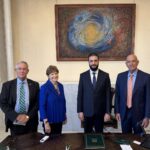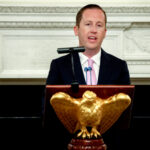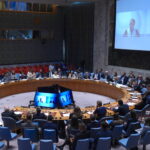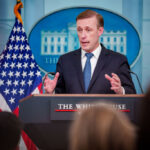Israel’s former ambassador to France said the airdrops of aid are a result of condemnation from European capitals

Antoine Gyori - Corbis/Corbis via Getty Images
British Prime Minister Keir Starmer is greeted by French President Emmanuel Macron ahead of the 'Coalition Of The Willing' summit in support of Ukraine at Elysee Palace on March 27, 2025 in Paris, France.
For European leaders who are ratcheting up pressure on Israel to end the humanitarian crisis in Gaza, the Jewish state’s moves to pause military activity to allow a freer flow of humanitarian aid and begin airdrops of aid are “steps in the right direction,” the German foreign minister said on Sunday.
But the aid crisis is inextricably linked, observers say, to a much larger and even thornier issue — a deal to end the grinding 21-month war with Hamas and a release of the hostages. Until such a deal is struck, the pressure from Europe, and from some inside Israel, likely won’t ease. And it could worsen, with some experts warning that European sanctions on Israel aren’t out of the question.
Daniel Shek, a former Israeli ambassador to France and a member of the Hostage Families Forum’s diplomatic team, said that the aid airdrops are “a result of international pressure and not sudden altruism.”
However, Shek said, they are “like Tylenol for a cancer patient. Surgery is needed, meaning the end of the war.”
A spokesperson for German Chancellor Friedrich Merz said that he is “prepared to increase the pressure if progress [on a ceasefire and humanitarian aid] is not made.”
French President Emmanuel Macron announced last week that his country would recognize a Palestinian state. French Foreign Minister Jean-Noël Barrot argued that the move “proves [Hamas] wrong. It supports the side of peace against that of war,” because “Hamas has always rejected the two-state solution.”
The terrorist group praised France’s “positive step in the right direction.”
England and Germany declined to join France in recognizing a Palestinian state, but their leaders released a statement with Macron focusing on the “humanitarian catastrophe” in Gaza and calling for “the most basic needs of the civilian population, including access to water and food [to be] met without further delay” and for Israel “to immediately lift restrictions on the flow of aid.”
Israel has argued that it is not restricting the flow of aid into Gaza, but that the U.N. refuses to cooperate with the U.S. and Israel supported Gaza Humanitarian Foundation to distribute it.
U.K. Prime Minister Keir Starmer said that he is “unequivocal” in his support for a Palestinian state, but that recognition must come as “part of a wider plan which ultimately results in a two-state solution and lasting security for Palestinians and Israelis. This is the way to ensure it is a tool of maximum utility.”
The IDF noted that “responsibility for food distribution to the population lies with the U.N. and international aid organizations. Therefore, the U.N. and international organizations are expected to improve the effectiveness of aid distribution and to ensure that the aid does not reach Hamas.”
Israel initiated on Sunday 10-hour “pauses” in the coming days in areas of Gaza in which there are no IDF ground troops, daily until further notice, “aimed at improving the humanitarian response in the Gaza Strip and to refute the false claim of deliberate starvation.”
In addition to 28 airdrops on the first day, the IDF established corridors to allow the safe movement of U.N. convoys of food and medicine. The military also noted that “responsibility for food distribution to the population lies with the U.N. and international aid organizations. Therefore, the U.N. and international organizations are expected to improve the effectiveness of aid distribution and to ensure that the aid does not reach Hamas.”
Starmer, however, said after the airdrops were announced on Saturday that “Israel must allow aid in over land…The situation is desperate.”
German Foreign Minister Johann Wadephul said that “humanitarian pauses and aid deliveries into Gaza are steps in the right direction, results of many direct conversations in the last few days. Yet the situation remains unbearable: Hamas must release all hostages, a comprehensive ceasefire is badly needed.”
Starmer reportedly plans to ask President Donald Trump to return to ceasefire talks with Hamas, during the president’s visit to Scotland on Monday. A source in his office told The Guardian over the weekend that Starmer will “discuss further with [Trump] what more can be done to secure the ceasefire urgently, bring an end to the unspeakable suffering and starvation in Gaza and free the hostages who have been held so cruelly for so long.”
The U.S. and Israel withdrew their teams from the negotiations in Doha, Qatar, last week, after Hamas rejected a ceasefire and hostage deal by making new demands in areas that had previously been resolved. U.S. envoy Steve Witkoff said that Washington was looking for “alternative options,” which Israeli Prime Minister Benjamin Netanyahu later echoed.
Germany similarly remained concerned about the humanitarian situation in Gaza, with Foreign Minister Johann Wadephul saying that “humanitarian pauses and aid deliveries into Gaza are steps in the right direction, results of many direct conversations in the last few days. Yet the situation remains unbearable: Hamas must release all hostages, a comprehensive ceasefire is badly needed.”
Merz and Netanyahu spoke on the phone on Sunday. Following the call, Merz said he asked Netanyahu “to do everything in his power to bring about an immediate ceasefire and called on him to allow urgently needed humanitarian aid to reach the starving civilian population in Gaza without delay.”
Israel is taking a different approach to each major European capital and its statements and actions on Israel, a Foreign Ministry source told Jewish Insider.
The Israeli Foreign Ministry summoned the French charge d’affaires for a demarche by Director-General Eden Bar-Tal on Sunday. A statement from the ministry said that France “chose to harm Israel in its most difficult hour…France directly harmed the negotiations to return the hostages and for a ceasefire and all future diplomatic negotiations.”
Soon after Macron’s announcement on Thursday, Netanyahu said that it “rewards terror and risks creating another Iranian proxy, just as Gaza became. A Palestinian state in these conditions would be a launch pad to annihilate Israel — not to live in peace beside it. Let’s be clear: the Palestinians do not seek a state alongside Israel; they seek a state instead of Israel.”
If the war continues, Daniel Shek, a former Israeli ambassador to France and a member of the Hostage Families Forum’s diplomatic team, warned, “we could find ourselves under real pressure, such as sanctions, even from friendly countries that blocked [such steps] until now. Israel is isolating itself.”
Though Berlin has continued to make critical statements, the Foreign Ministry source indicated that Jerusalem still views Germany as a largely supportive country.
The source noted that while there was significant domestic pressure over Germany’s Israel policy, it has not backed down, such as last week when Berlin declined to join a letter of 28 countries calling to end the war immediately.
In addition, Germany did not support moves to reexamine Israel’s “association agreement” with the EU, which could result in a chill in relations between Israel and its largest trade partner. Changes in the association agreement would require consensus from all 28 EU member states, several of whom would be unlikely to support downgrading ties with Israel.
Wadephul and Israeli Foreign Minister Gideon Sa’ar have met three times since the former entered office three months ago. In one of the meetings he said that Germany would not cut off arms sales to Israel.
Emmanuel Navon, an international relations lecturer at Tel Aviv University and fellow at the Jerusalem Institute for Security Studies, said that the aid drops would likely be enough to stop Germany from taking action against Israel.
“I find it hard to believe that Germany, who we have very close ties with, would do something like [downgrade the association agreement] unless Israel has totally cut off humanitarian aid … For German public agreement, you need aid flowing into Gaza,” he added.
Shek was skeptical that Germany would follow Macron in recognizing a Palestinian state, but said “even Germany is showing signs of impatience and urgency,” and that there are other steps that Berlin could take.
The former ambassador also said he thought that canceling the EU-Israel Association Agreement was unlikely, because Hungary and Eastern European states would not support it. However, he said that the Brussels bureaucracy could slow-walk agreements and cooperation with Jerusalem in areas that often depend on EU grants such as scientific research and culture.
If the war continues, Shek warned, “we could find ourselves under real pressure, such as sanctions, even from friendly countries that blocked [such steps] until now. Israel is isolating itself.”
That being said, Shek and Navon doubted that the latest moves from Europe actually constituted pressure on Jerusalem.
Shek dismissed angry Israeli reactions to Macron’s “recognition of a virtual Palestinian state state that doesn’t exist … Those reactions are only aimed at the Israeli voter and have no value in international relations.”
“We need to say Hamas is looting and the U.N. won’t distribute the aid — we don’t need to wait to be accused of starving [Gazans] to say it,” said Emmanuel Navon, an international relations lecturer at Tel Aviv University and fellow at the Jerusalem Institute for Security Studies. “The problem is that we wait to be attacked and then we react. Once the accusation is out, it’s hard to correct.”
Navon noted that other G7 countries were not on board with Macron’s initiatives, even those with left-wing governments like the U.K. and Canada.
“Macron has brought relations with Israel to the low of the early to mid 1970s … when France was graded as hostile in Israel’s foreign policy,” Navon said. “It will take years to repair after [Macron].”
Navon said that Israel needs to be more proactive in communicating what is happening in Gaza: “We need to say Hamas is looting and the U.N. won’t distribute the aid — we don’t need to wait to be accused of starving [Gazans] to say it. The problem is that we wait to be attacked and then we react. Once the accusation is out, it’s hard to correct.”
In addition, Navon said, “Netanyahu needs to get his act together and tell his ministers to shut up or take away their phones.”
He referred to remarks by Heritage Minister Amichai Eliyahu in a radio interview last week that “the government is racing ahead to wipe out Gaza … All of Gaza will be Jewish.”
“The prime minister has to have better control of rogue members of his government and party who are causing us terrible damage,” Navon added.
Shek, however, said the way to improve Israel’s relations with Europe and the rest of the world is to end the war in Gaza.
The former ambassador argued that the issue is not one of Israel doing a poor job at explaining the situation to the world: “If all of these countries have reached the conclusion that the war needs to end, then Israel needs to have a discussion with them to find out how they can contribute to a better reality after the war … We need to just get into a conversation about an exit strategy … which is something that the Israeli government has refused to do from Oct. 8, 2023, to this day.”






























































